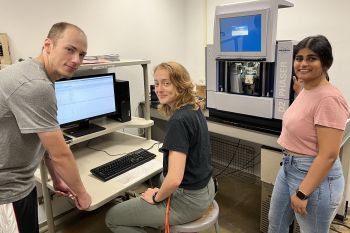Cholera-Fighting Research gets $2 Million in Federal Funding
CHICAGO, March 8, 2022—Illinois Institute of Technology is receiving a four-year grant from the National Institutes of Health (NIH) to fund research to develop drug treatments for cholera and other multi-drug-resistant strains of disease-causing bacteria.
The $2.17 million grant will allow researchers to develop a new generation of antibiotics to treat cholera and sexually transmitted diseases. There are an estimated 1.3 to 4.0 million cases and 21,000 to 143,000 deaths worldwide due to cholera annually, according to a National Center for Biotechnology Information study.
Oscar Juarez, Illinois Tech associate professor of biology and principal investigator, says that we have entered an age where many antibiotics have become obsolete because human pathogenic bacteria have mutated and is no longer susceptible to previous treatments. Cholera is a virulent, gastrointestinal disease that causes severe acute diarrhea. The bacteria is transmitted through contaminated water supplies and poor sanitation, and if left untreated can be deadly for children and adults.
“We need to keep an eye on cholera. Every time that we have a natural disaster that limits the availability of water, we can have an outbreak of cholera,” Juarez says.
Juarez, along with Illinois Tech Research Assistant Professor of Biology Karina Tuz and David Minh, associate professor of chemistry, have been studying the cell structures, proteins, and mechanisms of human pathogenic bacteria for more than a decade, specifically Vibrio cholerae. In earlier published studies by the team, they discovered that Vibrio cholerae and a number of other pathogenic bacteria rely on a sodium-dependent NADH dehydrogenase (NQR) enzyme. NQR is a respiratory enzyme that is essential for the survival of several types of bacterial infections because it provides energy to the cell and performs other essential functions.
Juarez says they have found two novel compounds with antibiotic properties that target the NQR enzyme. The grant will support research activities such as expanding lab capabilities to produce proteins on a large scale and acquiring new instruments that will help them find the right concentration levels of enzyme inhibitors to create an effective and safe antibiotic treatment.
The multidisciplinary grant also involves collaborators from Argonne National Laboratory and Loyola University Chicago. Jerzy Osipiuk, a protein crystallographer at Argonne, and his team will handle the crystallization and structural analysis of the drugs, and Daniel Becker, professor of chemistry at Loyola, and his team, will be engaged in medicinal chemistry research. Tuz will handle microbes testing and toxicity tests, and Minh will handle computational analysis and run simulations to help modify the drugs and identify effects the inhibitors could have on other human enzymes.
NQR is an optimal drug target because of its critical role in bacterial metabolism and its absence in the human body, Juarez says. This means a drug that destroys it is less likely to affect other human cells. The researchers will conduct several rounds of testing and modification of the compounds before a potential drug is ready for preclinical trials.




